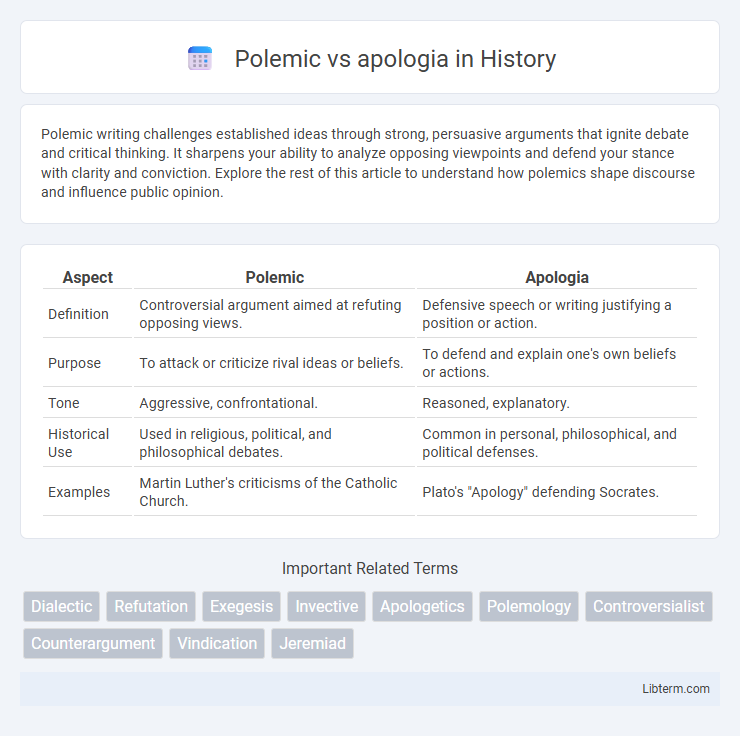Polemic writing challenges established ideas through strong, persuasive arguments that ignite debate and critical thinking. It sharpens your ability to analyze opposing viewpoints and defend your stance with clarity and conviction. Explore the rest of this article to understand how polemics shape discourse and influence public opinion.
Table of Comparison
| Aspect | Polemic | Apologia |
|---|---|---|
| Definition | Controversial argument aimed at refuting opposing views. | Defensive speech or writing justifying a position or action. |
| Purpose | To attack or criticize rival ideas or beliefs. | To defend and explain one's own beliefs or actions. |
| Tone | Aggressive, confrontational. | Reasoned, explanatory. |
| Historical Use | Used in religious, political, and philosophical debates. | Common in personal, philosophical, and political defenses. |
| Examples | Martin Luther's criticisms of the Catholic Church. | Plato's "Apology" defending Socrates. |
Defining Polemic: Origins and Characteristics
Polemic originates from the Greek word "polemikos," meaning "warlike" or "hostile," and refers to a strong verbal or written attack on a particular opinion or doctrine. It is characterized by aggressive argumentation and the intention to dispute or refute opposing viewpoints passionately. Polemics often arise in political, religious, or ideological debates, aiming to persuade audiences by highlighting contradictions and flaws in competing positions.
Understanding Apologia: Purpose and Forms
Apologia serves as a formal defense or justification of actions, beliefs, or ideas, commonly found in philosophical, religious, and legal contexts. This rhetorical strategy aims to clarify misunderstandings and persuade an audience by presenting coherent, reasoned arguments, often distinguishing itself from polemic by its constructive tone. Common forms of apologia include public speeches, written essays, and legal testimonies, each tailored to reinforce credibility and restore reputation effectively.
Historical Contexts of Polemics and Apologias
Historical contexts of polemics often involve intense debates during periods of ideological conflict, such as the Reformation, where religious and political views clashed sharply. Apologias historically emerged as formal defenses, exemplified by early Christian writings like Augustine's "Apologia," aimed at justifying beliefs against persecution and criticism. Both rhetorical forms reflect the sociopolitical tensions of their eras, with polemics driving confrontation and apologias seeking reconciliation or clarification.
Rhetorical Strategies in Polemic Writing
Polemic writing utilizes aggressive rhetorical strategies such as direct attacks, emotionally charged language, and logical fallacies to strongly oppose an idea or belief. It employs persuasive techniques like loaded words, rhetorical questions, and hyperbole to provoke strong reactions and undermine opposing viewpoints. These strategies aim to dominate discourse and compel readers to reject or criticize the targeted subject.
Techniques Used in Apologia Construction
Apologia construction employs techniques such as denial, evasion of responsibility, reducing offensiveness, corrective action, and mortification to defend a person's or organization's reputation. These strategies aim to restore credibility by either refuting allegations, minimizing harm, or demonstrating remorse and commitment to change. Effective apologia uses rhetorical appeals like ethos, pathos, and logos to persuade the audience and mitigate negative perceptions.
Famous Polemics and Their Impact
Famous polemics such as Martin Luther's 95 Theses and Voltaire's satirical writings shaped religious and philosophical debates, challenging established doctrines and authority. These contentious arguments incited public discourse, influencing social reforms and intellectual movements like the Protestant Reformation and the Enlightenment. The enduring impact of polemics lies in their power to provoke critical thinking, societal change, and the re-evaluation of accepted beliefs.
Notable Apologias Throughout History
Notable apologias throughout history include John Henry Newman's "Apologia Pro Vita Sua," a seminal work defending his religious conversion and addressing accusations against his character. Another significant example is Galileo Galilei's "Letter to the Grand Duchess Christina," which rationalizes his astronomical findings against church critiques. These apologias serve as structured defenses aimed at clarifying beliefs and actions in response to powerful opposition, distinguishing them from polemics that primarily engage in argumentation or dispute.
Comparative Analysis: Polemic vs Apologia
Polemic involves an aggressive, often confrontational argument aimed at refuting opposing viewpoints, emphasizing stark opposition and critique. Apologia, in contrast, serves as a reasoned defense or justification of one's actions or beliefs, focusing on persuasion and explanation rather than attack. Comparing both reveals that polemic prioritizes rhetorical force and conflict, while apologia emphasizes clarity, credibility, and reconciliation in discourse.
Contemporary Applications: Debate and Defense
Polemic and apologia play distinct roles in contemporary discourse, where polemics often fuel debates by aggressively challenging opposing views on social, political, or cultural issues. Apologia serves as a structured defense mechanism, providing reasoned responses to criticism, frequently utilized in public relations, political campaigns, and legal settings. Understanding these applications enhances strategic communication effectiveness in arenas such as media discussions, political debates, and online forums.
Choosing the Right Approach: When to Use Polemic or Apologia
Choosing the right approach between polemic and apologia depends on the communication goal and audience sensitivity. Polemic is effective when addressing controversial topics with strong, direct arguments to challenge opposing views and provoke debate. Apologia suits situations requiring defense against accusations or misunderstandings, aiming to clarify intentions and restore credibility through reasoned explanation.
Polemic Infographic

 libterm.com
libterm.com